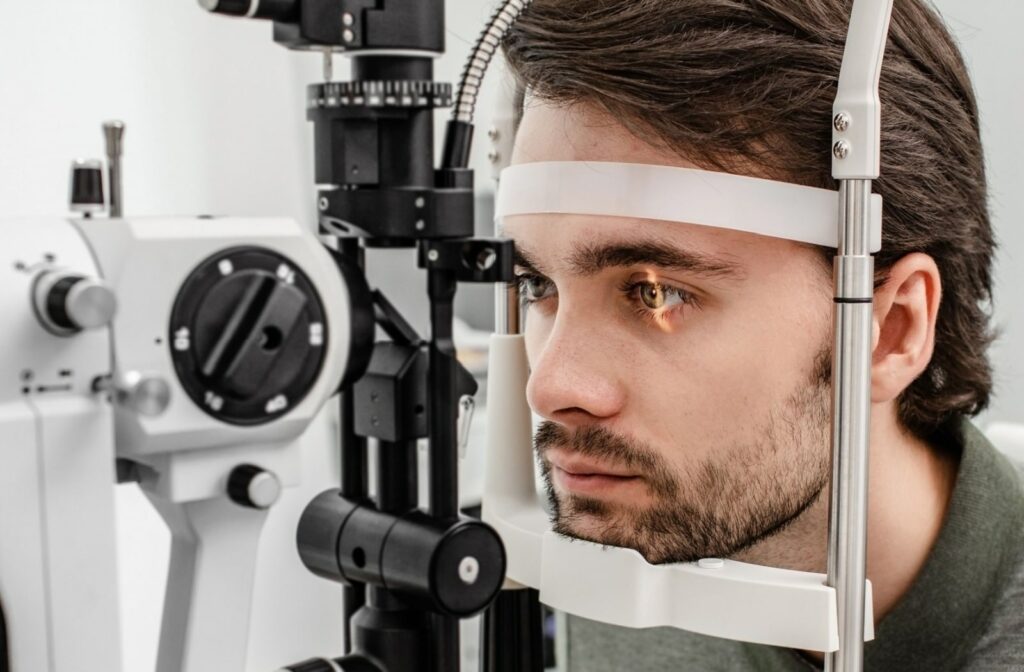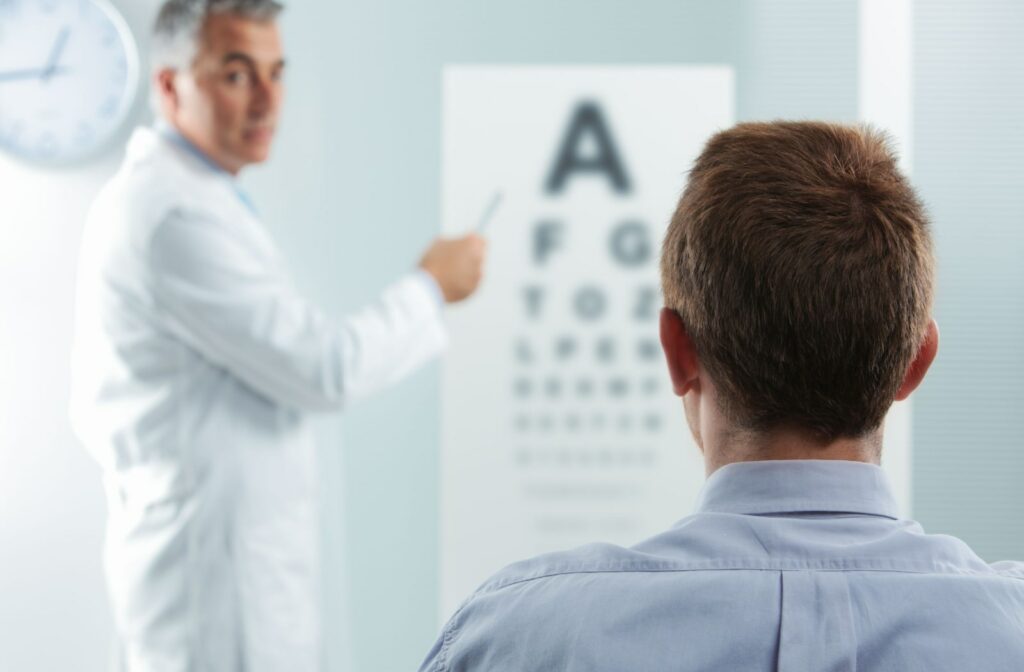Your eyes are precious, and they should always be prioritized. Regular comprehensive eye exams are an important part of taking care of yourself; they let an experienced optometrist monitor any changes and look for signs of all kinds of potential conditions.
During an eye exam, your optometrist can check for diseases like:
- Glaucoma
- Diabetes
- Age-related macular degeneration
- Cataracts
- Thyroid problems
- Rheumatoid arthritis
- Blepharitis
Why Are Eye Exams So Important?
Eye exams aren’t just about getting a new prescription. They’re about taking proper care of your eyes, checking for budding problems, and addressing them if necessary. Your optometrist will run through a series of different tests where they can check all the different parts of the eye to determine whether or not you have an eye condition.
Whether they’re checking your eye pressure, your visual clarity, the health of your optic nerve, or even the makeup of your tear film, these tests give your optometrist an in-depth understanding of your eyes and vision.
Glaucoma
Glaucoma, often referred to as “the silent thief of sight,” is a group of progressive eye conditions characterized by the buildup of pressure on your eye. It often progresses unnoticed, eventually putting additional pressure on the optic nerve. Once the optic nerve is damaged, permanent vision loss becomes a possibility.
During a regular eye exam, your optometrist can check the pressure inside your eye using a tonometry test. They’ll also be able to examine your optic nerve to determine whether or not you’re at risk of vision loss.
Diabetes
Diabetes is a complicated condition that can affect almost all of your body’s internal systems, and the eyes are no exception. Over time, periods of elevated blood sugar can damage the sensitive blood vessels in the back of the eye. They can begin to leak or even burst, releasing fluids into the eye. This is called “diabetic retinopathy.”
If you have diabetes, you should visit your optometrist at least once per year for a diabetic eye exam. During these exams, your optometrist can check the health of the blood vessels throughout the eye to find out if you’re at risk of diabetic retinopathy.
Age-Related Macular Degeneration
The human eye is remarkably complex. The retina, the group of light-sensitive cells at the back of the eye, is responsible for transmitting visual information to the optic nerve to be sent to the brain. Part of the retina called the “macula” is responsible for your clear central vision.
As we age, this macula can begin to break down. This is called “age-related macula degeneration” or AMD. This condition can cause:
- Blurry or fuzzy vision
- Difficulty reading or recognizing faces
- A dark, empty area or blind spot in the center of your field of vision
- Straight lines appearing wavy or distorted
While AMD isn’t curable, it can be effectively managed if caught early during a regular eye exam.
Cataracts
Cataracts are an extremely common condition, affecting at least 2.5 million Canadians. These develop when the lens located at the front of your eye begins to cloud over.
This lens is usually clear but can become blocked when certain proteins in the eye begin to break down and clump together, obstructing light from fully passing through the eye. This leads to:
- Blurred vision that worsens over time
- Increased difficulty with vision at night
- Sensitivity to light and glare
- Seeing “halos” around lights
- Frequent changes in eyeglass or contact lens prescription
- Fading or yellowing of colours
Fortunately, cataracts are easily treatable through a simple surgery.
Thyroid Problems
Thyroid problems, particularly Graves’ disease, are easily detectable during an eye exam. Your thyroid is responsible for regulating your body’s metabolism, and when it becomes overactive, it can cause swelling in the tissues around your eyes. This can lead to Graves’ ophthalmopathy, a condition that can cause symptoms such as:
- Bulging or protruding eyes
- Dry, red, itchy or irritated eyes
- Double vision or difficulty moving the eyes normally
- Sensitivity to light and glare
- Vision loss if untreated
If you are experiencing any of these symptoms, your optometrist can perform a simple test during your eye exam to determine whether or not your thyroid is functioning properly.

How Often Should You Have an Eye Exam?
If you don’t know whether or not it’s time for your next eye exam, it helps to follow a schedule. Try to follow these guidelines:
- 1 eye exam every year for children under the age of 20
- 1 eye exam every 2-3 years for adults between the ages of 20-39
- 1 eye exam every 2 years for adults between the ages of 40-64
- 1 eye exam every year for adults over the age of 65
- 1 eye exam per year for a person of any age if they have diabetes
Following these guidelines can be an easy way to take proper care of your eyes. However, if you notice any abnormalities with your vision or eyes, like blurriness, light sensitivity, or pain, don’t wait to see a professional; instead, try to see your optometrist as soon as you can.
Book Your Next Eye Exam Today
If it’s time for your next eye exam, come see our team at Toronto Centre Eye Care. We can check your eyes and vision to determine if you’re at risk of any of the conditions listed above. Don’t wait for symptoms to start; instead, book an appointment with our team today!



